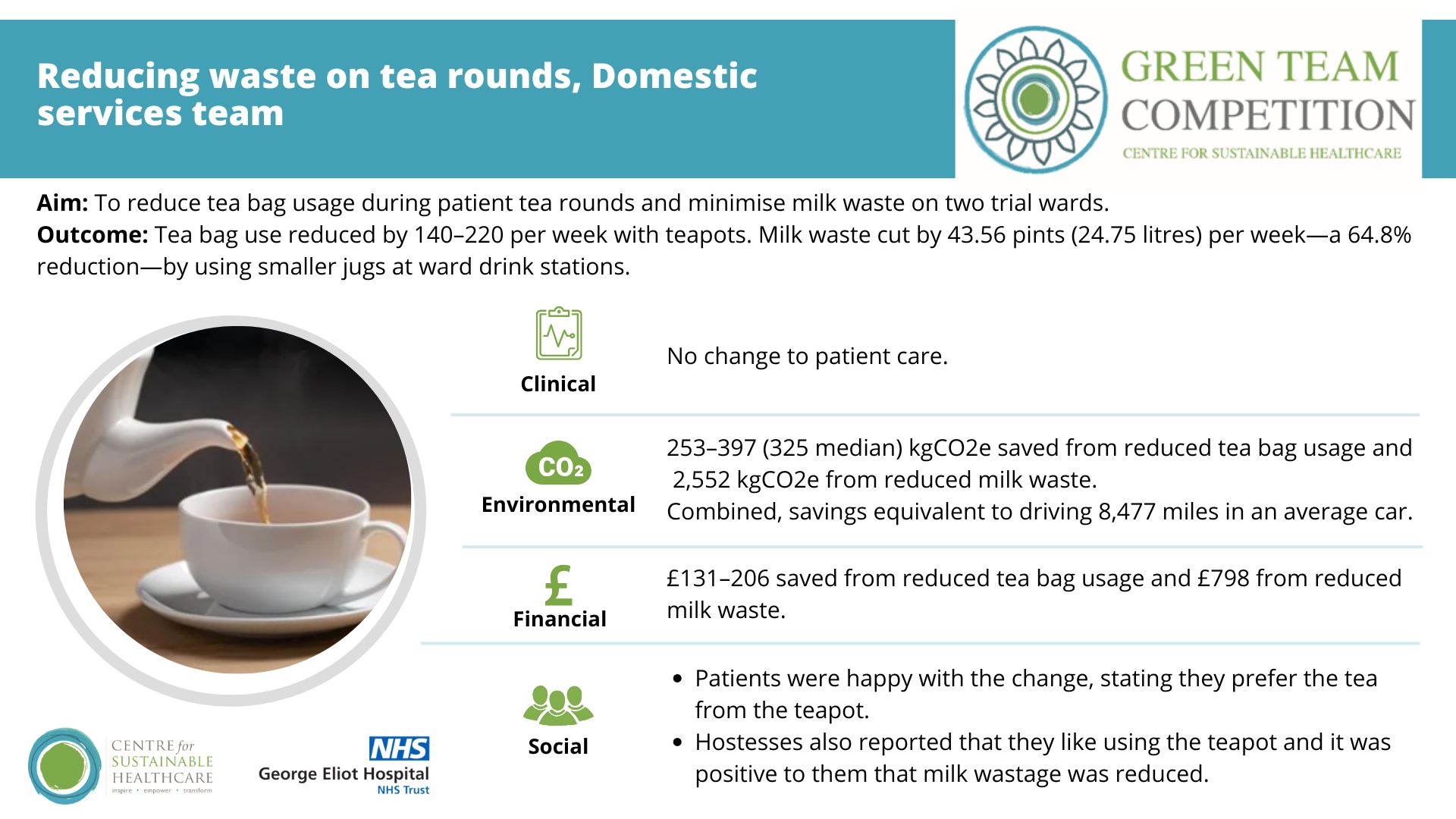Project completed as part of the 2024 Coventry and Warwickshire NHS ICS Green Team Competition.

Team members:
· Anneka Moore, Housekeeper
· Samantha Jones, Domestic Assistant
Setting / patient group: Inpatient wards
Issue:
Food and drink supplies contribute to the environmental impact and cost of healthcare services. Teabags are used once and are often non-recyclable. Milk has a high carbon footprint. At the George Eliot Hospital, staff explored the potential savings from making tea for patients in a teapot, rather than individual cups, and from reducing wastage of milk. Housekeepers, cleaners and hostess staff led the project, which focused on tea provided to patients within hospital wards.
Intervention:
The project focused on two wards (Alexandra and Felix). The team first looked at the existing process for serving tea. It is offered by hostesses at several points during the day and is then available on request from nurses during the night. Tea was made in individual cups using one teabag per person. On Alexandra, milk was left out at a hydration station for access. An exercise in recording waste found that 48 pints were wasted in one five-day period (64.8% of total). On Felix, where there is easier access to a fridge, minimal amounts were wasted. The intervention involved engaging hostess staff in the project to switch to using teapots instead of individual cups of tea. Using 8-12 teabags in a teapot (with top ups of water) serves a ward of 28 patients. On Alexandra, a small lidded jug for milk was introduced on the hydration station, so smaller amounts of milk would be left out.
Outcomes:
- Environmental
A process-based lifecycle assessment was used to estimate the carbon footprint of the teabags and milk. Prior to the change, 440 teabags were used per week on each ward. Following implementation, between 220-300 tea bags are used per week. As we have implemented this change on two wards, the projected annual carbon saving is 252.72–396.24 kgCO2e, equivalent to 744 and 1,166 miles in an average car.
In the week before our intervention, 48 pints of milk were wasted on the Alexandra ward. After our intervention, 4.44 pints were wasted. This is a reduction of 43.56 pints (24.75 litres) per week (5 days). This is a significant reduction in total waste, from 64.8% of milk wasted to 6% wastage. Accounting for the washing of milk jugs, this is a saving of 49.08 kgCO2e per 5 day week. With a similar reduction maintained across a year, this would be a saving of 2,265.12 pints of milk, 2,552.16 kgCO2e per year, equivalent to driving 7,520 miles in an average car.
- Social
Patients were happy with the change, stating they prefer the tea from the teapot. Hostesses also reported that they like using the teapot.
- Clinical
Tea and other drinks will still be provided on tea rounds and additionally on request, so there are no increased risks to patients (e.g. of dehydration). We have therefore not measured patient outcomes.
- Financial
The reduction in teabags gives an annual saving of £131.04–£205.92. The significant reduction in wasted milk gives a saving of £15.34 per 5 day week. With a similar reduction maintained across a year, this would be a saving of £797.70.
There is potential to further improve these savings by including weekends, optimising practice in the evenings, and implementing these changes across all 16 wards in the hospital.
Key learning point:
The recommendations about using milk and tea differently require engagement to embed in the long term and staff need to be supported and educated on why we are doing this and the impact. Working with the waste management team, catering team and the ward managers, who all offered help and support, contributed to the success and learning from this project.
Please log in or sign up to comment.